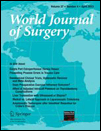Laparoscopic Surgery for Rectal Cancer: Outcomes in 513 Patients
Abstract
Background
Few reports have demonstrated the feasibility and efficacy of laparoscopic resection in patients with rectal cancer (RC). The objective of the present study was to assess the effectiveness of laparoscopic resection for RC, with an emphasis on perioperative variables and long-term oncological outcomes.
Methods
This prospective study was carried out between January 2005 and September 2010 and included 513 patients diagnosed with RC who underwent laparoscopic surgery. Patients with locally advanced RC (cT3/cT4 or N+) received neoadjuvant treatment. Adjuvant treatment was applied to patients with stage II/III disease or according to the neoadjuvant protocol. All patients were followed-up prospectively for the evaluation of complications and oncological outcome. Survival rate analysis was performed using the Kaplan–Meier method.
Results
Sphincter-preserving surgery was performed on 389 patients, and the remaining 124 patients underwent abdominoperineal resection. Perioperative mortality occurred in only one patient (0.2 %), and 27 (5.3 %) intraoperative complications were recorded. The most common postoperative complication was anastomotic leakage (5.5 %). The conversion rate was 6.4 %. The mean number of harvested lymph nodes was 23.6 ± 13. The mean distance to the distal margin was 2.6 ± 1.9 (0–7) cm. Distal margin positivity was detected in 9 (1.7 %) patients. The circumferential margin was positive in 39 (7.6 %) cases. After a median follow-up period of 30 (1–78) months, recurrence occurred in a total of 59 patients (11.5 %). Local recurrence was detected in 16 patients (3.1 %), and both local and distant recurrence was found in 7 patients (1.4 %). Distant recurrence only was detected in 43 patients (8.4 %). The overall 5-year survival rate was 84 %, and the 5-year disease-free survival rate was 77.4 %. The local recurrence-free survival rate was 98.4 % at 2 years, 95.7 % at 3 years, and 94.3 % at 5 years.
Conclusions
Our results, together with the review of the literature, clearly demonstrate that laparoscopic resection for RC is a feasible method at specialized high-volume centers. The long-term outcomes are at least as good as those from open surgery as long as the principles of oncologic surgery are respected and faithfully performed.




